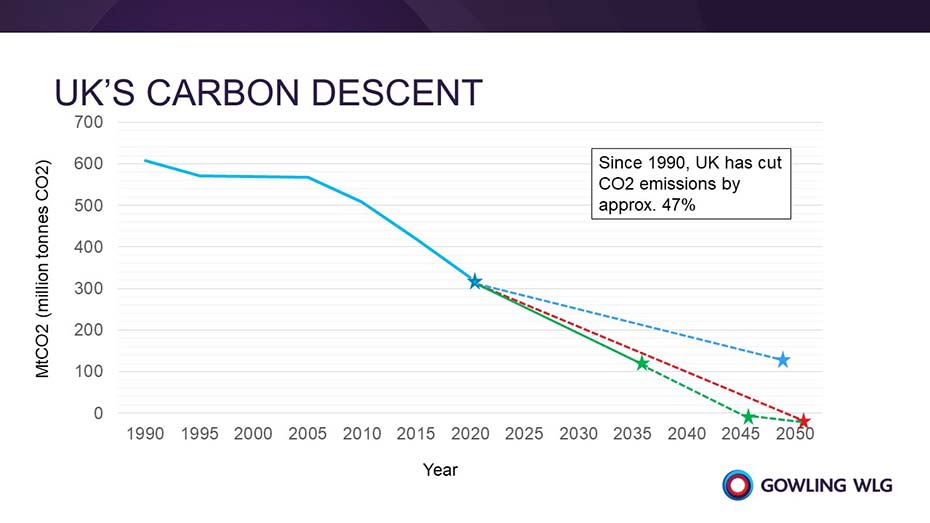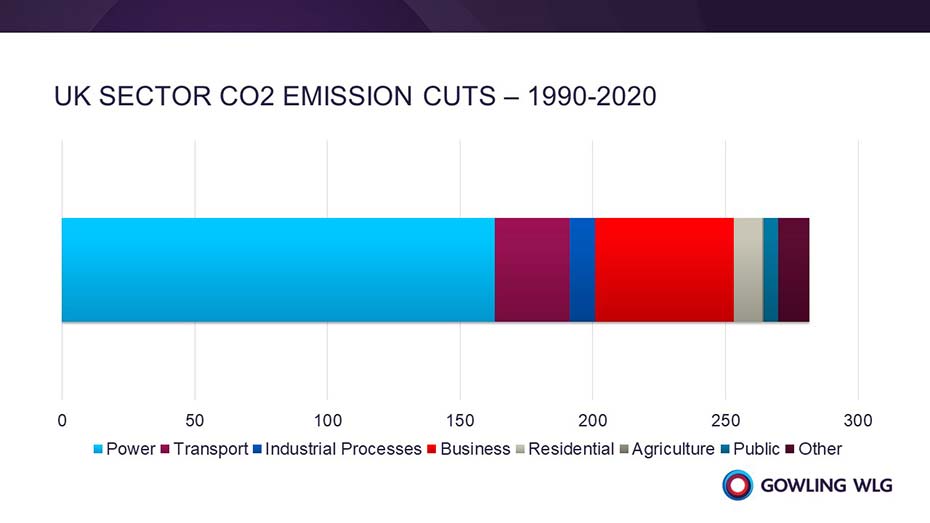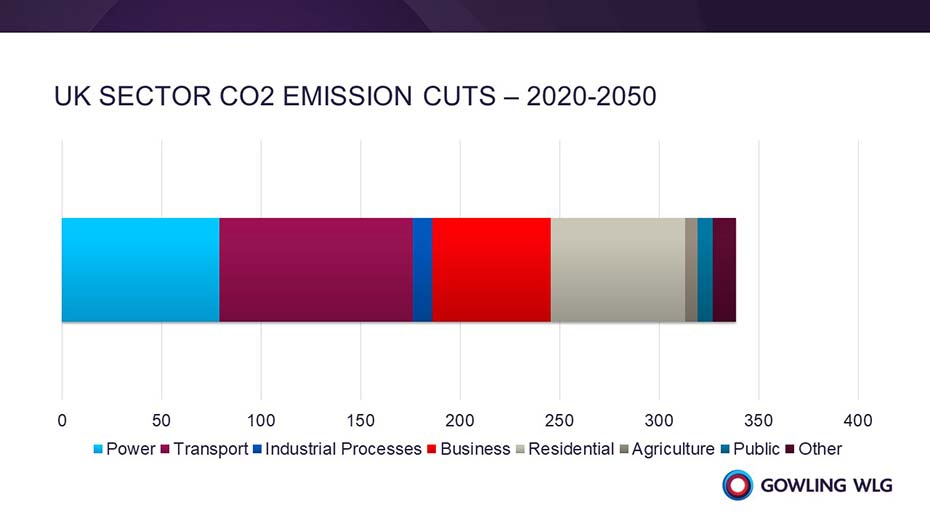In the run-up to the 26th United Nations Framework Convention on Climate Change (UNFCCC) Conference of the Parties, COP26, the Government published its Net Zero Strategy: Build Back Greener (the NZS), which is designed to deliver the Prime Minister's Ten Point Plan for a Green Industrial Revolution. The NZS aims to show how the UK can meet its commitment to reduce greenhouse gas emissions to net zero within thirty years and, in doing so, play its part in the international effort to keep average global temperature increases to 1.5 degrees Celsius above pre-industrial levels; thereby reducing the devastating effects of climate change.
This article answers some key questions about the NZS and highlights areas to consider in your business planning to stay in line with regulatory change, support the national action plan on climate change, and harness opportunities in the green economy.

What does the NZS cover?
The NZS is long at more than 350 pages, but it's comprehensive. It makes the case for net zero and describes how the following sectors will play their part:
- Power
- Fuel supply and hydrogen
- Industry
- Heat and buildings
- Transport
- Natural resources, water and F-gases
- Greenhouse gas removal
In addition to setting long-term policy aspirations for projects and infrastructure, the NZS sets out how the Government proposes to support the transition to the new green economy by: promoting innovation; securing green investment; creating green jobs, skills and industries; embedding net zero in government; encouraging local climate action; empowering the public and businesses to make green choices; and developing international leadership and collaboration.
How big is the task ahead?
The UK has made substantial progress in cutting carbon but all sectors still have a lot of work to do. Since 1990, the UK has cut its carbon dioxide emissions by nearly half, meaning that it has at least as much to do in the next 30 years as it has achieved already. The Government hopes that the NZS will be the policy framework that enables these cuts to be achieved.

Notes to the above graphic:
- In the figure above, the solid blue line shows the cuts to date, with the broken blue line showing the previous 80% cuts target.
- The broken red line shows a straight line to net zero by 2050.
- The solid green line shows the cuts needed to hit 78% cuts by 2035 (announced earlier this year); with the broken line showing the likely path thereafter.
Which sectors have made the deepest cuts to date?
Since 1990, the power sector has been the standout sector in terms of carbon cuts, achieved in no small part by decommissioning coal-fired power plants, deploying offshore wind at scale, as well solar pv. On 30 October 2021, the UK's electricity needs were met principally by wind (29.7%), natural gas fired-power stations (23%), nuclear (19.5%), solar (10.8%), imports from the Netherlands, Norway, France and Belgium (9.6%), and biomass (5.4%).
The significant efforts by the transport sector (particularly road transport) to reduce tailpipe emissions are largely masked by the growth in vehicle numbers and therefore the net cuts in carbon cuts are lower than might be expected. Business and industry have also made notable contributions to carbon reductions.

What CO2 cuts have to be made between now and 2050?
Every business in every sector has a role to play in decarbonising. The chart below shows current carbon emissions on a sector-by-sector basis, and therefore highlights the emissions each sector must cut before 2050.
The transport sector is likely to make rapid progress given the UK Government's policy of banning the sale of petrol and diesel-fuelled cars by 2030. The other standout sector is residential – and we are already seeing policy moves in this area, for example in relation to renewable heat. The greatest challenge is retrofitting existing homes in the coming years.

So what policies are highlighted by the NZS?
Investment needed: £150-270 billion.
Job opportunities: Up to 59,000 jobs in the green power sector by 2024, rising to up to 120,000 by 2030.
Policy highlights:
- By 2035 the UK will be fully decarbonised, powered entirely by clean electricity, subject to security of supply.
- A final investment decision on a large-scale nuclear plant (Sizewell C) will be made by the end of this Parliament, and a £120 million Future Nuclear Enabling Fund will be established, to kickstart future nuclear technologies, including Small Modular Reactors.
- 40GW of offshore wind by 2030 (installed or consented?), and further support for more onshore, solar, and other renewables.
- A new approach will be adopted in relation to onshore and offshore electricity networks that takes into account the needs of local communities like those in East Anglia who will be most impacted by the connections.
- Aspirations to build 1GW of floating offshore wind by 2030 which the Government hopes will put the UK at the forefront of this new technology.
- Deployment of new flexibility measures including storage to help smooth out future price spikes.
- Market-wide rollout of smart meters with a new four-year policy framework that introduces fixed minimum annual installation targets for energy suppliers from 1 January 2022.
- Ensure the planning system can support the deployment of low carbon energy infrastructure.
Investment needed: £20-30 billion.
Job opportunities: 10,000 jobs by 2030 in fuel supply.
Policy highlights:
- Deliver 5GW of hydrogen production capacity by 2030.
- Government has set up an Industrial Decarbonisation and Hydrogen Revenue Support (IDHRS) scheme, worth up to £140 million, which will fund new hydrogen and industrial carbon capture business models. The Government expects to award contracts of up to 250MW of electrolytic hydrogen production capacity in 2023, with further allocation in 2024.
- Implement the £240 million Net Zero Hydrogen Fund and finalise the Hydrogen Business Model and the Low Carbon Hydrogen Standard in 2022.
- Possibly as a result of recent backlashes against the award of oil and gas licenses in the North Sea, the Government will introduce a "climate compatibility checkpoint" for future licensing on the UK Continental Shelf. It also proposes to regulate the oil and gas sector in a way that minimises greenhouse gases.
Investment needed: £14 billion.
Job opportunities: Up to 54,000 by 2030.
Policy highlights:
- Deliver four carbon capture usage and storage clusters, capturing 20-30 MtCO2 across the economy, including 6 MtCO2 of industrial emissions per year by 2030 and 9 MtCO2 annually by 2035.
- The Hynet and East Coast Clusters will act as economic hubs for green jobs. Teesside and the Humber, Merseyside and North Wales (the North East of Scotland as a reserve cluster) will likely be among the early SuperPlaces – areas where new industries such as hydrogen production can sit alongside carbon capture usage and storage and renewable energy generation.
- Future-proofing industrial sectors, and the communities they employ by establishing a £315 million Industrial Energy Transformation Fund (IETF), (£289 million for England, Wales and Northern Ireland, £26 million for Scotland).
- In collaboration with the Steel Council the Government will consider the recommendation of the Committee on Climate Change to set targets for ore-based steelmaking to reach near-zero emissions by 2035.
- Develop several Resource and Energy Efficiency (REEE) measures, with the ambition of achieving the anticipated requirement of 11 MtCO2e worth of savings by 2035, including up to 3 MtCO2e of potential abatement in the Iron and Steel sector. It is likely this will impact the construction, automotive, and electronics sectors.
- Incentivise cost-effective abatement in industry at the pace and scale required to deliver net zero, through the UK Emissions Trading Scheme.
Investment needed: £200 billion.
Job opportunities: Up to 100,000 jobs by the mid-2020s and up to 175,000 jobs in 2030.
Policy highlights:
- All new heating appliances in homes and workplaces will be low carbon from 2035 (e.g. electric heat pumps, hydrogen boilers), with no new gas boilers being sold.
- A decision in relation to hydrogen heating will be taken in 2026, following the trial launch of a Hydrogen Village.
- A £450 million three-year Boiler Upgrade Scheme will mean that households are able to access grants up to £5,000 for low-carbon heating systems (to bring the cost in line with the current cost of gas boilers).
- A £60 million Heat Pump Ready programme will provide funding for pioneering heat pump technologies and will support the government's target of 600,000 installations a year by 2028.
- The Government wants to reduce electricity costs so will look at options to shift or rebalance energy levies (such as the Renewables Obligation and Feed-in Tariffs) and obligations (such as ECO) away from electricity to gas over this decade. The Government will look at options to expand carbon pricing and remove costs from electricity bills.
- Funding for the Social Housing Decarbonisation Scheme and Home Upgrade Grants will be made available – with the Government investing £1.75 billion. Funding of £1.425 billion will be made available for public sector decarbonisation, so that emissions from public sector buildings are reduced by 75% by 2037.
Investment needed: £220 billion.
Job opportunities: 22,000 jobs in 2024 and up to 74,000 jobs in 2030.
Policy highlights:
- Remove all tailpipe emissions and kickstart zero emissions international travel.
- End the sale of new petrol and diesel cars and vans by 2030, and hybrids by 2035.
- Introduce a zero emission vehicle mandate setting targets for a percentage of manufacturers' new car and van sales to be zero emissions each year from 2024.
- £620 million of funding to be made available for zero emission vehicle grants and electric vehicle infrastructure, with a focus on local on-street residential charging.
- £350 million (of the £1 billion Automotive Transformation Fund) to support the electrification of UK vehicles and supply chains.
- Trials of three zero emission HGV technologies at scale on UK roads to determine their operational benefits, as well as their infrastructure needs.
- £2 billion investment to enable half of journeys in towns and cities to be cycled or walked by 2030.
- £3 billion to create integrated bus networks, more frequent services and bus lanes to speed journeys.
- 4,000 new zero emission buses and associated infrastructure, and a net zero rail network by 2050, with the ambition to remove all diesel-only trains by 2040.
- Following the Clean Maritime Demonstration Competition, the Government will extend it to a multi-year programme (real-world demonstrations and technology trials of clean maritime vessels and infrastructure).
- Investment in rail electrification and city rapid transit systems.
- Become a world-leader in zero emission flights and kick-start the commercialisation of sustainable aviation fuel (SAF). Government aims to deliver 10% SAF ;by 2030, with £180 million funding for the development of SAF plants.
Investment needed: £30 billion.
Job opportunities: 1,900 jobs in 2024 and 2,000 jobs in 2030.
Policy highlights:
- Treble woodland creation rates in England as part of a UK-target of increasing planting rates to 30,000 hectares per year by the end of this Parliament.
- Support low-carbon farming and agricultural innovation via the Farming Investment Fund and the Farming Innovation Programme to invest in equipment, technology, and infrastructure.
- Increase the Nature for Climate Fund (£640 million) with a further £124 million for peat restoration, woodland creation and management.
- Restore approximately 280,000 hectares of peat in England by 2050.
- £75 million funding for net zero related R&D across natural resources, waste & F-gases.
- £295 million to enable Local Authorities in England to prepare to implement free separate food waste collections for all households from 2025.
Investment needed: £20 billion.
Job opportunities: (No figure stated).
Policy highlights:
- Aim to deploy at least 5 MtCO2/year of engineered greenhouse gas removals (GGRs) by 2030.
- £100 million of investment in GGR innovation to leverage private investment and demand for transferrable engineering expertise from the UK's oil and gas sector.
- Explore options for regulatory oversight to provide robust monitoring, reporting and verification (MRV) of GGRs.
Time to re-focus your business strategy?
Following the close of the global climate change conference COP26 we expect there to be a real shift in momentum across nations and businesses to accelerate how they are responding to climate change. The announcement of the NZS in the UK is therefore timely and provides guidance for businesses in terms of how planned regulatory and policy changes in their sector will likely impact their operations.
The ambitions are high, and so is the level of investment planned according to NZS, with transport, power and heat and buildings expected to need the biggest injection of cash. However, whichever sector you operate in, there are clearly opportunities to re-align your business strategy now and help shape the green economy. Planned changes will naturally influence consumer behaviour and create a growing demand to buy green and make greener choices in day-to-day life. Those companies that act early and seek out the opportunities to harness this growth area will make the greatest gains.
The first step is understanding what the above changes will mean for your sector and your business; what is your current 'green' position (how do you impact the environment in terms of consumption of resources as well as the environmental footprint made); how will you be affected by climate change in light of the predictions made; what information do you currently share with stakeholders (and also how should this change or be expanded upon); and what role could your business play in supporting the national action plan around climate change and, ultimately, improving the planet.
Our team of legal experts in Environmental, Social and Governance (ESG) support clients in responding to the issues raised by these important questions. Comprising lawyers from a range of disciplines, they are fully engaged in developments in this area and working with businesses from a wide range of sectors to advise on their approach to ESG matters.
To discuss any of the issues raised in this article and in the NZS specifically, please get in touch with either your relationship contact here at Gowling WLG or partner Ben Stansfield from our ESG team.